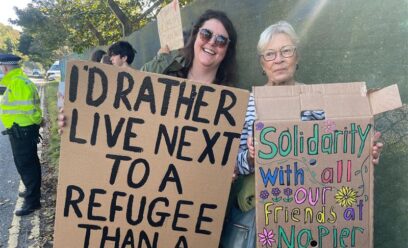Dr. Miatta Fahnbulleh: “My confidence comes from my determination”
Posted by Michael Butscher on October 28, 2022For #BlackHistoryMonth, IMIX talks to the inspirational Dr. Miatta Fahnbulleh who came to the UK as a refugee in the 1980s and is hoping to become the next Labour MP for Camberwell and Peckham.
Dr. Miatta Fahnbulleh fled Liberia with her younger brother and parents to the United Kingdom at the start of the country’s deadly civil war in 1986. She was only five years old. Her journey is a concrete example of what and how people who arrive seeking asylum can contribute to the development of British society when given an opportunity. Her brother, Gamal, is an accomplished journalist and presenter with ITV Granada.
Born in Liberia to a Liberian father who was foreign minister and a Sierra-Leonean mother, they were granted asylum in the late 1980s by the British government.
Since September 2022 when she announced she was running to be the Prospective Parliamentary Candidate in Camberwell and Peckham at the next general election, Miatta’s life has never been busier. But she is quite prepared for the challenge explaining why she wants to represent Camberwell and Peckham.
“When we came here as refugees, there was a big Sierra Leonean community in Peckham. This was the community where I spent a lot of time, my family would come to buy food and we visited other families; so there is an emotional connection. I always had that feeling in my head that when I decided to enter politics, that I should represent people in this constituency. Seeing the day-today struggle of people in Camberwell and Peckham keeps me focused. The kind support and encouragement I have received from people has been humbling.”
Miatta’s journey from being a child refugee to the possibility of becoming a Member of the British Parliament has been an extraordinary one, and she beams with confidence.
“Our parents sacrificed everything to make sure we had a shot in this country and the best possible start. I defied the odds; my brother defied the odds. But for too many children, that was not the case. That has to change. That is why I became an economist and that is why I went into policy and into government.
“My biggest challenge was working for the Prime Minister’s office for seven years. I am proud of what we did there and what I achieved. I achieved a lot but not everything I wanted to before leaving.
“My confidence comes from my determination. And this is why I feel challenged to stand as a Member of Parliament to try to drive big change.
“Black people have to get involved in politics and that is the only way we would have a voice in helping to shape things. I understand why some people feel politics does not work for them and quite frankly, it is not working for them, but the way we change it is by getting involved, making sure that our voices outweigh other voices.’
Miatta graduated from Oxford University with a BA in Philosophy, Politics and Economics (PPE) and netted a PhD in Economic Development from LSE. Since then, her rise has been meteoric. She was the Head of Cities in the policy unit at the Labour Cabinet Office, director of policy and research at the Institute for Public Policy and Research (IPPR) before being appointed the Chief Executive of the New Economics Foundation (NEF), a British think-thank that promotes social, economic and environmental justice. Miatta also sits on the Economic Ministerial Advisory Board of Wales advising the Welsh government on economy-related matters and chairs the Croydon Climate Crisis Commission.
Miatta has acquired in-depth experience in developing and delivering policy to empower communities and change people’s lives. She is a champion in generating new ideas on reshaping the British economy inside and outside government.
On Black History Month, Miatta believes that one month is not enough: “Black History month is really important. It is right to celebrate our history, our culture, the people who have shaped our culture, the story of how Black people made progress in this country, but a month is not enough and we need to do it every day. It is a moment to remind ourselves that there is a bigger fight every month and year until we achieve racial justice and equality. We are a long way from doing that in this country. We need to use this month to remind us of what we are fighting for, rather than just observe the month.”
The Liberian British economist believes that immigration has hugely benefitted the United Kingdom: “London is a great example of how immigration has benefitted this country. Britain is made out of generations and generations of immigrants from Africa, Asia, Caribbean, Europe and every stage in our history is made up of people contributing, shifting our culture, shifting the way we work, operate and also contributing to our economy. For me, immigration is a success story of every country. It is sad we have got to a point where immigration has been made toxic but if you look at the facts, the benefits of immigration to any country, any society always outweigh the losses.”




